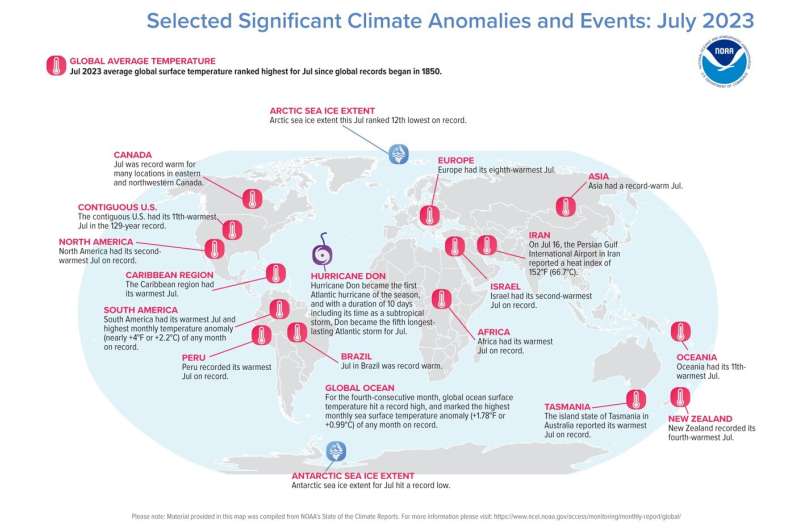This article has been reviewed according to Science X's editorial process and policies. Editors have highlighted the following attributes while ensuring the content's credibility:
fact-checked
trusted source
proofread
Record shattering: Earth had its hottest July in 174 years

Earth just roasted under its hottest July on record, according to scientists from NOAA's National Centers for Environmental Information (NCEI).
For the fourth-consecutive month, the global ocean surface temperature also hit a record high.
Here's a closer look into NOAA's latest monthly global climate report:
Climate by the numbers
July 2023
The average global surface temperature in July was 2.02°F (1.12°C) above average, ranking it as the warmest July in NOAA's 174-year record. Because July is the globe's warmest month of the year from a climatological perspective, July 2023 was also likely Earth's warmest month on record.
July 2023 was the first time an average July temperature exceeded 1.8°F (1.0°C) above the long-term average. Also of note, last month was 0.36 of a degree F (0.20 of a degree C) warmer than the previous July record from 2021. July 2023 marked the 47th-consecutive July and the 533rd-consecutive month with temperatures above the 20th-century average.
For the fourth-consecutive month, the global ocean surface temperature hit a record high as El Niño conditions that emerged in June continued into July. Globally, July 2023 set a record for the highest monthly sea surface temperature anomaly—which indicates how much warmer or cooler temperatures are from the long-term average—of any month in NOAA's climate record, with an anomaly of 1.78°F or 0.99 of a degree C. On July 13, NOAA's Climate Prediction Center issued a statement announcing a greater than 95% chance that El Niño will continue through winter in the Northern Hemisphere.
The year to date (January through July)
The first seven months of 2023 ranked as the third-warmest such YTD on record, with a global temperature of 1.85°F (1.03°C) above the 20th-century average of 56.9°F (13.8°C).
According to NCEI's Global Annual Temperature Outlook and data through July, it is virtually certain (> 99.0%) that 2023 will rank among the five-warmest years on record, with a nearly 50% probability that 2023 will rank as the warmest on record.
Other notable climate events in the report
Sea ice coverage hit a record low: July 2023 set a record for the lowest global July sea ice extent (coverage) on record. Globally, sea ice extent in July 2023 was about 470,000 square miles less than the previous record low from July 2019.
Antarctic sea ice coverage ranked lowest on record for a third-consecutive month, running about 1 million square miles—roughly the size of Argentina—below the 1991–2020 average. This was 580,000 square miles below the previous record low from July 2022. The Arctic sea ice extent for July 2023 ranked as the 12th smallest in the satellite record, about 220,000 square miles below the 1991–2020 average.
Storm count was near average in the tropics last month: Eight named storms occurred around the world in July, which is near the 1991–2020 average of 9.6. Seven of those reached tropical cyclone strength (winds of 74 mph or higher), including three that reached major tropical cyclone strength (winds of 111 mph or higher). Hurricane Don was the first Atlantic hurricane of the season, and with a duration of 10 days including its time as a subtropical storm, Don became the fifth longest-lasting Atlantic storm for July.
Provided by NOAA Headquarters



















